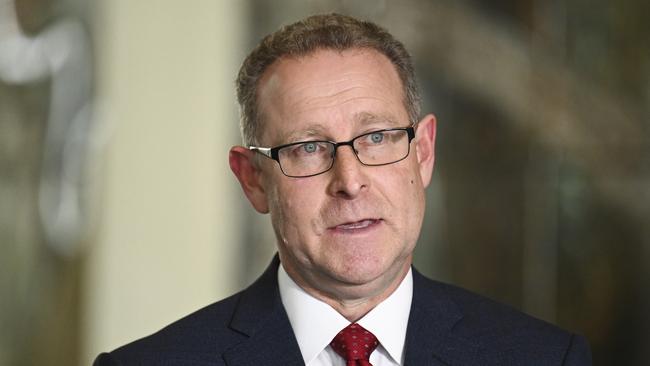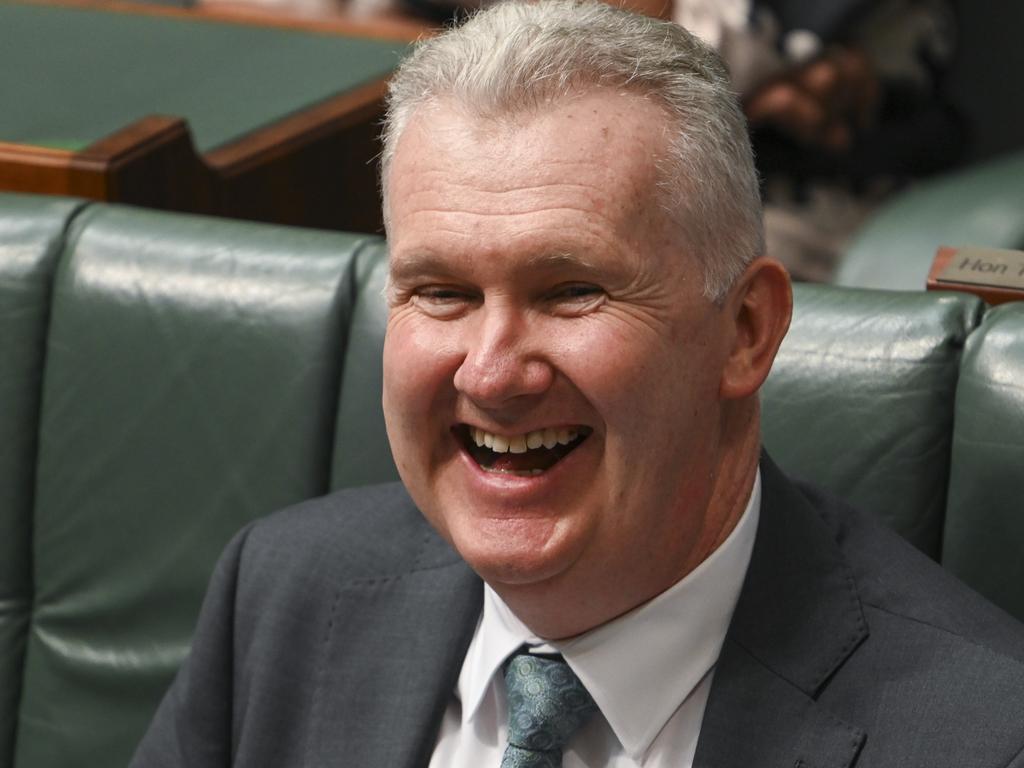ALP mistake on wage theft laws is criminal, say bosses
Employers have attacked Labor’s tough new laws criminalising the deliberate underpayment of workers as a ‘sop to unions’ that would be used to threaten businesses ahead of the federal election.

Employers have attacked Labor’s tough new laws criminalising the deliberate underpayment of workers as a “sop to unions” that would be used to threaten businesses, sharpening the political fight over wages and workplace relations ahead of the federal election.
As softer than expected wages and economic data increased the prospect of a February interest rate cut, the ACTU said the new underpayment regime would help prevent the unlawful exploitation of vulnerable workers.
The latest industrial relations battle came as the Reserve Bank said this week it was increasingly optimistic that the risk of inflation failing to fall to its target level had diminished in recent months, and that a sharper-than-expected decline in wages growth could pave the way for mortgage relief to millions of households across Australia.
Workplace Relations Minister Murray Watt said the long-awaited wage-theft laws, to come into force from January 1, would mean it would “finally” be a criminal offence to deliberately underpay workers. “Businesses deliberately doing the wrong thing will be caught, and will be charged,” Senator Watt said.
Employers who intentionally underpaid workers could face criminal charges carrying penalties of up to 10 years’ imprisonment for individuals.
Maximum financial penalties range from more than $1.6m for individuals and more than $8m for companies. The government stressed the offence would not apply to honest mistakes and would not apply to employers that inadvertently underpaid workers.
While intended to be used as a last resort, the government says the criminal penalties are designed to target unscrupulous, deliberate conduct that denies workers their entitlements and undercuts businesses that are doing the right thing.
Australian Chamber of Commerce and Industry chief executive Andrew McKellar said the new laws were an “overreach” that would add “yet another layer of complex and burdensome regulation on business, especially small business”.
“Overwhelmingly most employers are just trying to get on with business and do the right thing by their employees – most wage underpayments occur by accident due to the staggering complexity of the Fair Work Act and our modern awards system,” Mr McKellar said. “If the government wants to prevent underpayments, it needs to simplify our workplace relations system – instead in less than two years they have rewritten nearly every part of the Fair Work Act and expanded its size by over 500 pages.
“Case in point: the government’s own employment and workplace relations department has failed to pay staff correctly, even with immense resources and dedicated pay teams at their disposal – how on earth can we expect small business to get it right?”
Australian Industry Group chief executive Innes Willox said his organisation did not condone noncompliance with workplace laws, but criminal penalties did not address why most underpayments occurred
“These issues should have been left to Fair Work Act’s civil contravention framework and existing labour exploitation offences under the Commonwealth Criminal Code,” Mr Willox said.
“Putting criminal penalties in place is simply a sop to some unions to give them more to threaten employers with.”
Backing the laws, the ACTU said estimates of the extent of wage theft varied widely given that it was deliberately hidden by employers. It said that, based on Fair Work Ombudsman audits, the level of annual wage theft was between $850m and $1.55bn, while superannuation theft was estimated by the Super Members Council to cost 2.8 million Australian workers $5.1bn in legal super entitlements.
Acting ACTU secretary Joseph Mitchell said the new laws would make a huge contribution to ending wage theft and super theft as a business model. “Workers deserve every dollar of their pay and super and should get the money that is owed to them,” Mr Mitchell said.
“Businesses need to pay their workers properly, especially vulnerable younger workers.”
Senator Watt said that “after years of being hung out to dry by a Coalition government who didn’t care, Labor’s laws will crack down on bosses who do the wrong thing”. “We’ve worked closely with business groups, especially small businesses, to ensure that those who accidentally underpay their staff have nothing to fear,” Senator Watt said.
“The commencement of this law sends the very clear message to workers and employers that our government will not stand for behaviour that takes advantage of workers and robs them of their entitlements.”
As businesses face off with Labor and unions over wages laws, minutes from the RBA board’s policy meeting this month, released on Tuesday, showed the central bank suggested a sharper slowdown in wages growth could signal that potential labour supply was more abundant than had been assumed. It noted it was possible for wages growth to slow even when employment was above its full level, so long as the labour market was moving towards better balance and inflation expectations remained anchored.
The RBA also discussed the possibility the slowing was in response to earlier weakness in productivity growth, noting growth in unit labour costs had also declined from their previously rapid rate, according to the minutes.
It came as the government has released a voluntary small-business, wage-compliance code designed to provide small business employers with a clear pathway to avoid criminal prosecution for the new wage theft offence.
If a small business employer underpays an employee but satisfies the Fair Work Ombudsman that it has complied with the code, they can’t be referred for criminal prosecution by the FWO under the new offence.
A small business could point to the actions it has taken, including that it received information from its employer organisation, the Fair Work Ombudsman or a union, or that it corrected mistakes and repaid workers. All employers may also be able to enter a co-operation agreement with the Fair Work Ombudsman. These agreements may be available if an employer’s conduct could amount to a criminal offence but it has sought to co-operate with the Fair Work Ombudsman and remedy the effects of its conduct.
Mr Willox said criminal proceedings would disadvantage workers, including the most vulnerable, because they would delay civil recovery of underpayments. He said the prospect of criminal penalties would also be a barrier to some employers self-disclosing and rectifying underpayments. “Employers are already grappling with an historic change to workplace laws, which don’t actually serve to create one job,” he said. “More regulations and penalties on businesses simply ultimately flow through to higher costs for consumers. We all pay in the end for these sorts of decisions.”
Additional reporting: Matt Bell








To join the conversation, please log in. Don't have an account? Register
Join the conversation, you are commenting as Logout